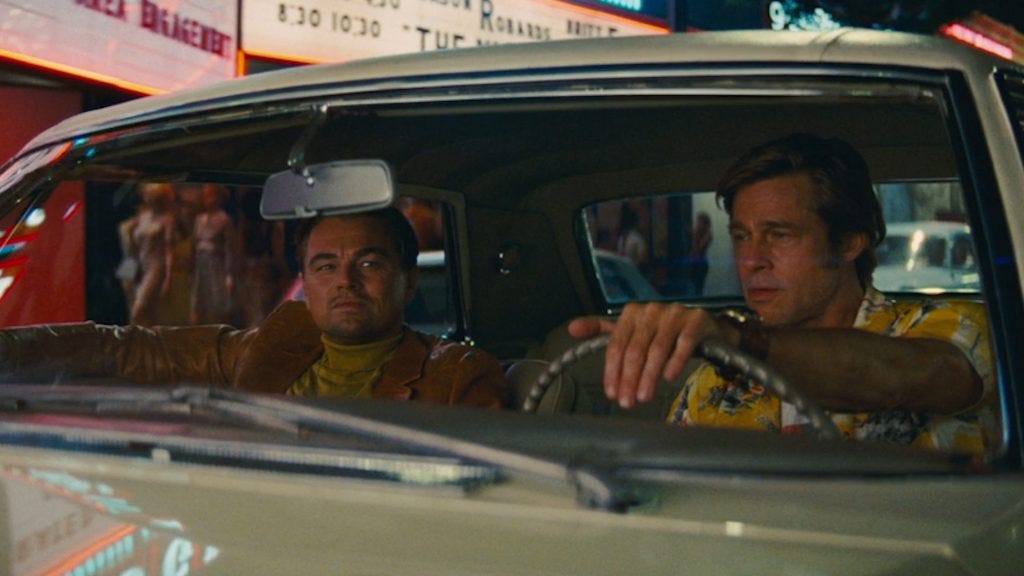On "Once Upon a Time...in Hollywood"
Note: Spoilers Ahead
I've never been on the QT bandwagon, but it's also always been clear that Tarantino has a voice and a viewpoint and something to say. At his best, he creates all-encompassing alternate worlds that closely parallel our own, but exist as a fantasy, allowing him to both comment on our world and escape it. Inglorious Bastards is the prime example and I think has been his best and most powerful film to date. For me, Once Upon a Time creates a similar experience and along with IB is his best, most engrossing, and most mature film.
The world of 1969 Hollywood is lovingly evoked with incredible detail and definition. Like some sort of VR hallucination, the film pulls you into late 60's Hollywood (or at least QT's version of it). It's a beautiful place and like a good open world video game, part of the fun is simply exploring the world and all its amazing detail.
There are a lot of themes floating through Once Upon a Time. A list of a few:
--The exploration of art and acting, through the contrasting careers of Rick Dalton, later in his career, trying to hang on and make one last run at the ring, and Sharon Tate, the ingenue, going to the movies to innocently revel in seeing herself on the big screen alongside Dean Martin.
--The role of capitalism, advertising, and entertainment in shaping the world we live in reflected in the constant radio ads, the long scenes devoted to showing the TV shows and movies within the movie, and Manson family girl declaring that Hollywood has taught us how to murder and its time they got their due.
--The fear of the counterculture. Hippies versus cowboys, the Mansons versus Cliff.
--Class. The three main characters seem to represent three distinct classes. Cliff, the working class stiff; Rick the upper class Hollywood actor (though not always upper class); and Sharon the educated/elite class (European ties etc.). The fantasy is, of course, that they all get along splendidly. Cliff is happy to serve Rick and Sharon and Rick happily accept each other at the end. However, the hippies who seem to reject the class system all together are shunned and disliked by all (no wonder, all the hippies we see are part of the Manson Family cult).
--Fear of powerful women. There are a lot of powerful women in this movie--they are pretty much all bad, from Dakota Fanning's Squeaky Fromme to Zoe Bell's Janet. The two most powerful positive females are a child--Trudi, played amazingly by Julia Butters, and Brandy the pit bull.
--The romanticizing and glorifying of the traditionally feminine and motherhood, as embodied by Sharon Tate, who SPOILER ALERT, is not killed by the Manson family, and instead lives on into a mythic future, delivering a child, staying married to Roman Polanski, thereby keeping him from raping a 13 year old. In fact, in this alternate reality, I think Polanski casts Rick Dalton as Jake Gittes in Chinatown (check out the poster in the driveway--looks like a mashup of Leo and Jack).
--Sex. Oh wait, there is no sex in this movie other than Pussycat offering herself to Cliff. And there's no nudity. And come to think of it, for all of his pushing the boundaries of taste, QT features almost no nudity or sex in any of his films. In fact, all three of our main characters seem pretty asexual. Cliff rejects Pussycat (rightly so). Rick brings home a beautiful Italian bride and promptly leaves her at home to drink with Cliff. And after we meet Sharon and Roman, the movie jumps forward six months, and voila Sharon is pregnant (the movie version of the Immaculate Conception).
--The questioning and at the same time glorifying of the masculine. Rick Dalton as the privileged male with low self-esteem struggling like everyone else and Cliff Booth as the morally upstanding cowboy, checking ID to make sure he doesn't get a blow job from an underage (but beautiful) hippie chick (he's no Polish-French Eurotrash willing to ply 13 year olds with drugs and alcohol) in one scene, and then mercilessly bashing another hippie chick's (not so beautiful) face into pulp in another scene.
Uh, this is beginning to not sound so good after all. But I think the genius of QT is the way in which he can have his cake and eat it too. The movie is a fantasy. It creates an alternate world where the masculine isn't so toxic (face bashing and blow torching aside) and old fashioned ideas of masculinity seem decent and good (especially compared to the current example of masculinity inhabiting the WH). Femininity can be still be worshipped and inspirational in the form of a beautiful, glowing pregnant woman. But, at the same time, the movie does invite to question all of this. Because we know it's a fantasy. It's not just fiction--it creates an alternate fantastical reality, but is a fantasy we constantly know is a fantasy. We know what really happens to Sharon Tate, we dread it coming, but when it doesn't, when QT rewrites history, we are relieved and happy to share his fantasy, but because we know the truth, we must also question the entire fantasy that has been presented to us. And so, we question the presentation of the masculine, and the feminine, and the counter culture, and the American myths (the western, Hollywood) and forced to confront all of these thing. We escape into the fantasy, but reality keeps whispering in our ear.
A couple of other notes: A career defining role from Brad Pitt, a great soundtrack, one of QT's most stylistically accomplished films, and great to see NLR's own Monica Staggs still living in the Tarantino universe.


